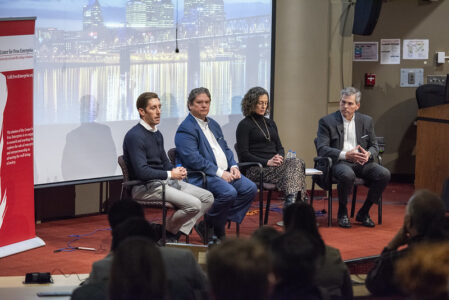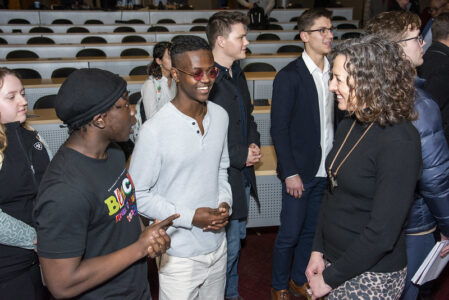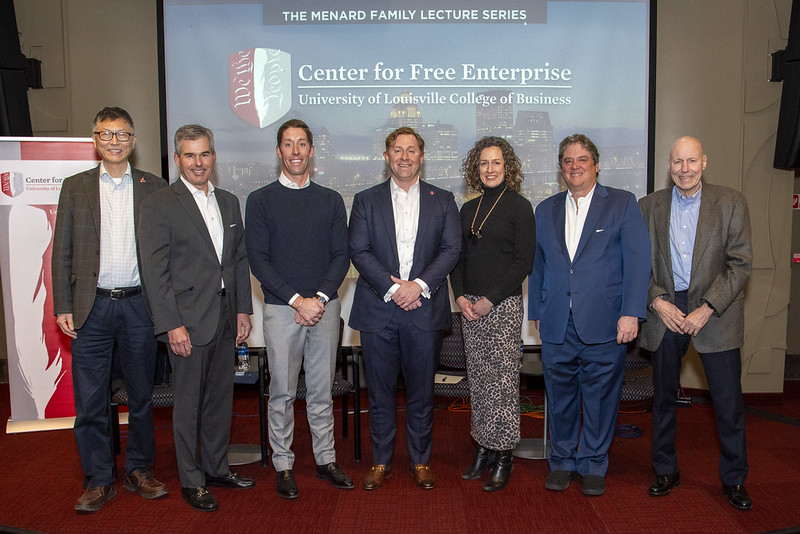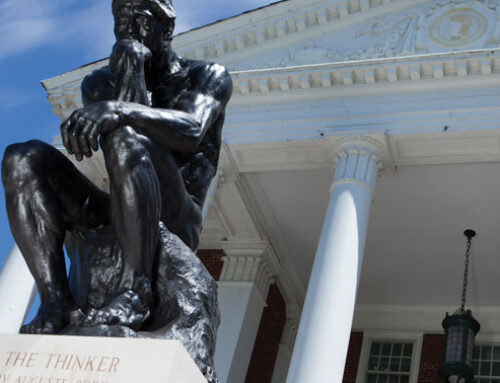By Laren Hines
The year of 2020 brought Louisville into a stalemate. Locals carried out social justice protests in the summer while the pandemic quickly crept into — and uprooted — the once bustling nature of the city’s commercial spaces. And now, many real estate professionals are contending that Louisville never quite rebounded from that purgatory.
On Tuesday, business students and local professionals alike gathered in Horn Auditorium for a discussion panel over Louisville’s downtown revival. The event was also held in conjunction with the launch of U of L’s Commercial Real Estate minor. College of Business Dean Jeff Guan announced that the program officially started this semester, with the goal being to mitigate future shortages in the real estate industry.
CBRE Managing Director David Hardy moderated the panel which featured three local commercial real estate giants: Chris Dischinger, owner of LDG Development, Weyland Ventures CEO Mariah Gratz, and Colin Underhill, founder of Pluris Real Estate.

Members of the panel discuss the future of Louisville post-pandemic. Photo by Susan Harrison, Office of Communications and Marketing.
Amid rising costs, it has become more difficult for city initiatives to fund larger projects, especially enough to repurpose the 2 million square feet of vacant space in Louisville’s Central Business District.
“It’s challenging to get things to line up right now,” Gratz said about project scoping in the city, especially post-pandemic.
The panelists also cited more recent issues that may be driving people out of downtown.
“It’s an excuse at this point – the lack of feeling safe or unsecured,” Underhill said, referring to growing concerns over public safety in the city, including the recent shooting near Fourth Street Live! this past weekend. “It is up to us as Louisvillians. The energy feels different.”
However, the panelists also provided hopeful insight into Louisville’s potential, both in new and signature ventures.
“I would love to see us embrace a stronger music scene,” Dischinger said. “All [these] cities were built on entertainment and music. We’ve got a vibrant music scene. It’s just spread out.”

Event attendees interact with a member of the panel. Photo by Susan Harrison, Office of Communications and Marketing.
As for signature industries, all three panelists wanted a stronger embracement of Louisville’s bourbon scene.
“It’s important for Kentucky to continue to embrace [bourbon],” Gratz said.
Dischinger called Louisville the “epicenter of bourbon.” Both pointed out the unique experiences that distilleries can offer, and Underhill designated the bourbon trail as a key tourist attraction, making Louisville the top Airbnb location search last summer.
Underhill also noted the power the University of Louisville has in the downtown scene. The KFC Yum! Center, which houses both Cardinal basketball teams among other events, is seeing historically low turnouts for the men’s team amid a poor-performing season.
The catalysts for key developments moving forward include realizing that “the biggest economic driver in the city is the University of Louisville,” he said. Dean Guan agreed, stating that the main reason for introducing the real estate minor was to encourage graduates to stay in downtown Louisville for their careers.
The panelists were optimistic about downtown Louisville’s reinvention and acknowledged the business students in attendance as the future of the city. Underhill provided words of motivation to the panel audience.
“It’s time to bring it back and we can,” he said.
Photo Courtesy // Susan Harrison, U of L OCM





